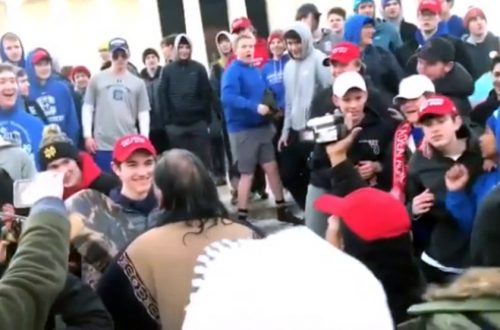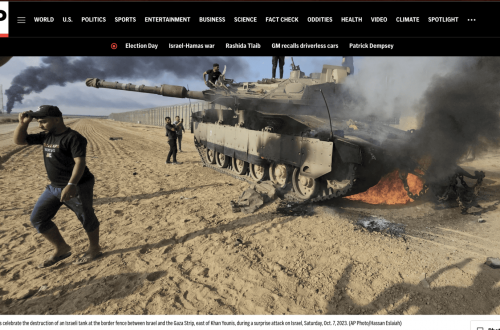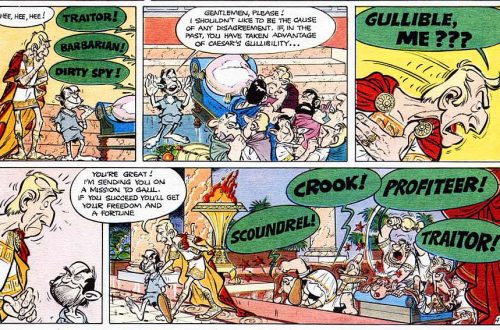Earlier this week in Homs, citizen journalist Khaled Abu Saleh– one of many courageous Syrians who are documenting the Assad regime’s brutal and murderous crackdown on opposition protesters and providing the world with a view from Syria that foreign media are denied– confronted Mohamed Ahmed Mustafa al-Dabi, the Sudanese head of the Arab League’s monitoring mission.
(As The Sudan Tribune reports: “Dabi is believed to have been instrumental in the founding of the Janjaweed – a militia operating in Darfur which has been accused of committing multiple atrocities. His appointment to the AL position received widespread condemnation from human rights organisations.”)
Thanks to DaveM, here is a translation of their exchange:
Saleh: Let us tell you about the situation here. It’s because of that you recognise what you’re working here [what it is you’re doing here]. The problem isn’t with you lot as people or as observers. The problem is with the initiative in and of itself. You came as observers to observe. You have to implement the initiative The initiative has a number of clauses but the very first one is to stop the killing. You lot were in Homs and the regime killed 15 people. I didn’t benefit in any way from the delegation being there. It didn’t protect the people who went into the street. Yesterday hundreds of thousands of people went into the People’s Square
Dabi: I believe [saw] what happened yesterday and the evening the following day. But do you expect that all of what took place during six months, or nine months, or three months can be managed by one clause?
Saleh: Stop the killing!
Dabi: Calm down, we’re working to lead to a dialogue.
Saleh: How can I arrive at a dialogue while there are waterfalls of blood on the ground? Yesterday hundreds of thousands of protesters went out protesting and you were fine. You’re still in the square. The security forces said they will not open fire if the delegation of observers are present. Or if the president of the delegation is present. Sir, yesterday they [the security] killed 15 people. You were there and they showed you the child. That child was killed, the child was killed.
Dabi: I saw, I saw.
[people speak over each other]
Dabi: Anything that happens…
Saleh: Sir, a question: you all came here in order to stop the killing, that’s the first clause. But when you move to another area the regime comes back and opens fire in the [previous] place. The regime is laughing at us. It’s taking [not clear] in order to kill more people. You came here and yesterday you saw bread being distributed to the people? It was only because you were here did the people get bread. The people went for five days without bread. The people spent five days dying under siege, they were being fired at by artillery.
Second observer: That was the first day, and God willing… [not clear]
[clip ends]
As I wrote to Dave: “Abu Saleh is one brave dude. I fear for his safety now, but I guess he knew he was putting his life on the line by doing this.”
He may enjoy a measure of protection as long as the AL delegation is in Syria. But what will happen after they leave?
Another citizen journalist in Homs, Basil al-Sayed, was shot in the head and killed while documenting the regime’s repression. The video he was shooting when he was killed has been uploaded to YouTube.
“We have thousands of citizen journalists,” [activist Rami] Jarrah told NPR’s Deb Amos. “But Basil was one of those who stood out.”
Jarrah said al-Sayed filmed security forces opening fire directly at protesters, and that put him at serious risk.
“He was documenting stuff that no one could actually get hold of,” Jarrah said. “I don’t want to say this was expected, but he was always in those situations where you could expect something would happen to him.”
…..
Al-Sayed documented the uprising using a small Samsung camcorder that has a red body. He uploaded hundreds of hours of footage to YouTube. He has a brother and sister, and he was the youngest in his family. He worked at an aluminum plant in Homs.In Bab Amr, the neighborhood that has come under a heavy attack by the security forces over the past few months, the role of al-Sayed was instrumental in relaying information and getting the word out, Jarrah added.
May the coming year see a blessed end to the wretched Assad regime and the beginning of a better life for the people of Syria.


